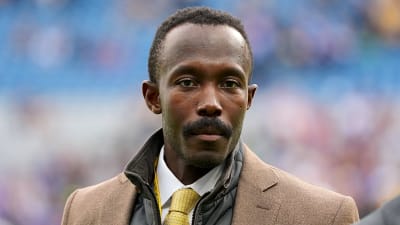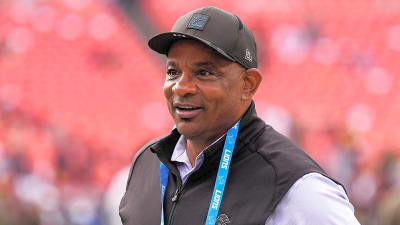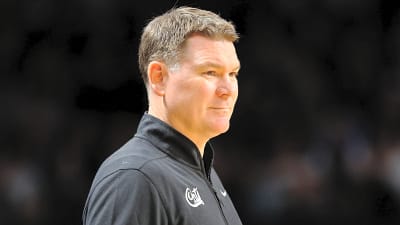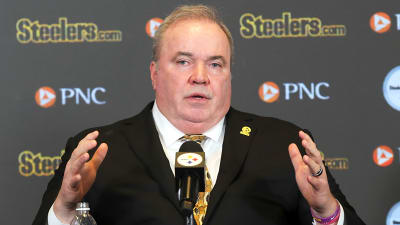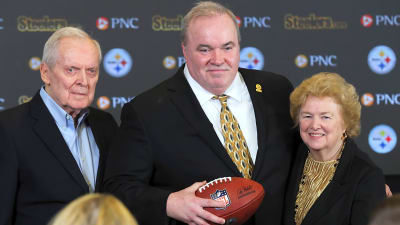- Home
- Quizzes
- My Quiz Activity
- Newsletters
- MY FAVORITES
- Add Sports/Teams
- SPORTS
-
NFL
- NFL Home
- Arizona Cardinals
- Atlanta Falcons
- Baltimore Ravens
- Buffalo Bills
- Carolina Panthers
- Chicago Bears
- Cincinnati Bengals
- Cleveland Browns
- Dallas Cowboys
- Denver Broncos
- Detroit Lions
- Green Bay Packers
- Houston Texans
- Indianapolis Colts
- Jacksonville Jaguars
- Kansas City Chiefs
- Las Vegas Raiders
- Los Angeles Chargers
- Los Angeles Rams
- Miami Dolphins
- Minnesota Vikings
- New England Patriots
- New Orleans Saints
- New York Jets
- New York Giants
- Philadelphia Eagles
- Pittsburgh Steelers
- San Francisco 49ers
- Seattle Seahawks
- Tampa Bay Buccaneers
- Tennessee Titans
- Washington Commanders
-
MLB
- MLB Home
- Athletics
- Arizona Diamondbacks
- Atlanta Braves
- Baltimore Orioles
- Boston Red Sox
- Chicago White Sox
- Chicago Cubs
- Cincinnati Reds
- Cleveland Guardians
- Colorado Rockies
- Detroit Tigers
- Houston Astros
- Kansas City Royals
- Los Angeles Angels
- Los Angeles Dodgers
- Miami Marlins
- Milwaukee Brewers
- Minnesota Twins
- New York Yankees
- New York Mets
- Philadelphia Phillies
- Pittsburgh Pirates
- San Diego Padres
- San Francisco Giants
- Seattle Mariners
- St. Louis Cardinals
- Tampa Bay Rays
- Texas Rangers
- Toronto Blue Jays
- Washington Nationals
-
NBA
- NBA Home
- Atlanta Hawks
- Boston Celtics
- Brooklyn Nets
- Charlotte Hornets
- Chicago Bulls
- Cleveland Cavaliers
- Dallas Mavericks
- Denver Nuggets
- Detroit Pistons
- Golden State Warriors
- Houston Rockets
- Indiana Pacers
- Los Angeles Clippers
- Los Angeles Lakers
- Memphis Grizzlies
- Miami Heat
- Milwaukee Bucks
- Minnesota Timberwolves
- New Orleans Pelicans
- New York Knicks
- Oklahoma City Thunder
- Orlando Magic
- Philadelphia 76ers
- Phoenix Suns
- Portland Trail Blazers
- Sacramento Kings
- San Antonio Spurs
- Toronto Raptors
- Utah Jazz
- Washington Wizards
-
NHL
- NHL Home
- Anaheim Ducks
- Boston Bruins
- Buffalo Sabres
- Calgary Flames
- Carolina Hurricanes
- Chicago Blackhawks
- Colorado Avalanche
- Columbus Blue Jackets
- Dallas Stars
- Detroit Red Wings
- Edmonton Oilers
- Florida Panthers
- Los Angeles Kings
- Minnesota Wild
- Montreal Canadiens
- Nashville Predators
- New Jersey Devils
- New York Islanders
- New York Rangers
- Ottawa Senators
- Philadelphia Flyers
- Pittsburgh Penguins
- San Jose Sharks
- Seattle Kraken
- St. Louis Blues
- Tampa Bay Lightning
- Toronto Maple Leafs
- Utah Mammoth
- Vancouver Canucks
- Vegas Golden Knights
- Washington Capitals
- Winnipeg Jets
- NCAAF
- NCAAM
- Olympics
- Boxing
- Entertainment
- Lifestyle
- Golf
- MMA
- Soccer
- Tennis
- Wrestling
- Sports Betting
- More Sports
- RESOURCES
- My Account
- YB on Facebook
- YB on Twitter
- YB on Flipboard
- Contact Us
- Privacy Policy
- Terms of Service

The 75 best sports nicknames of all time
Nicknames add color to sports and often become so popular that they serve as an athlete's de facto first name. Sometimes they are seemingly random, and sometimes they make perfect sense. But the best ones become iconic and serve as a way of remembering the greats long after their playing days. From "Magic" to "Mean Joe" to "The Big Hurt," let's take a look, in no particular order, at the best nicknames in sports history and the athletes who inspired them.
LeBron James: King James
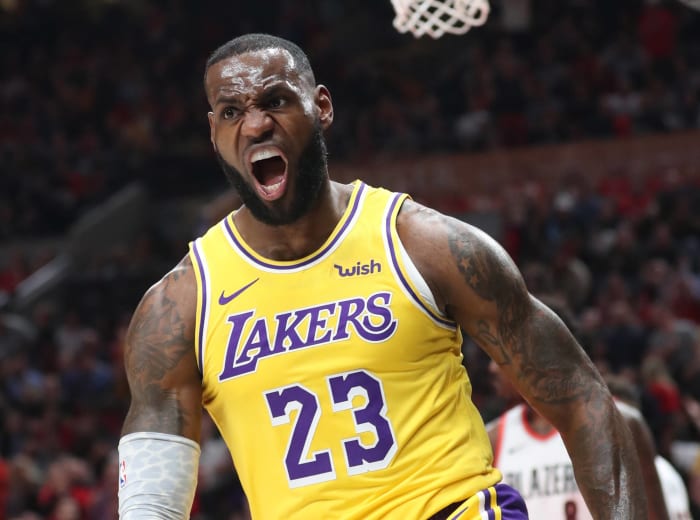
Does this nickname really need much explanation? For many fans, James has done the unthinkable and supplanted Michael Jordan as the greatest basketball player of all time. The "King James" moniker applies in every way, from his primacy in the sport to the way that any team that secures his services becomes an instant contender, as well as the league's most-watched franchise. James is the most popular, visible athlete in the country, if not the world.
Marvin Hagler: Marvelous
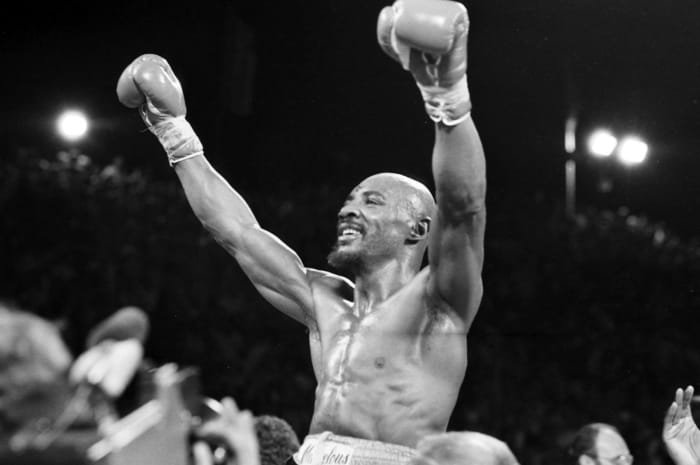
Technically, this isn't even a nickname because Hagler, annoyed that announcers did not refer to him by his preferred nickname, eventually changed his real name to "Marvelous Marvin Hagler." While the word marvelous is flowery and makes one think of a real artist in the ring, Hagler had one of the greatest chins in boxing history and was a relentless pressure fighter without a weakness. He is unquestionably one of the greatest boxers, regardless of weight class, of all time.
Charles Barkley: Sir Charles
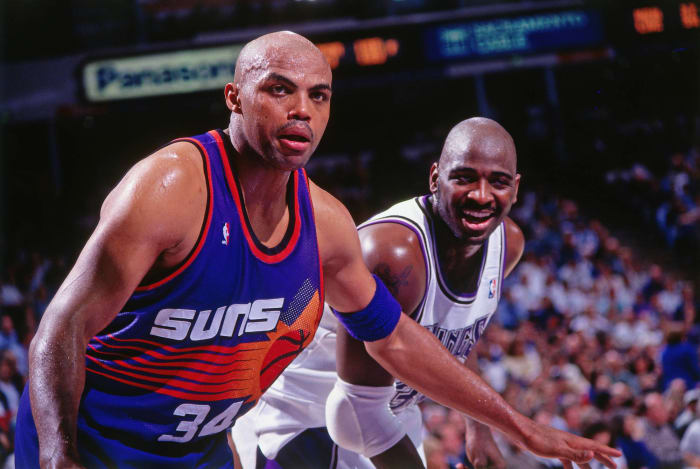
"The Round Mound of Rebound" could also have applied here, and while that nickname is a lot more fun to say, it's a mouthful. "Sir Charles" is much quicker, and funnier, given Barkley's rough and tumble play on the court, as well as his loud, brash commentary off it. There is very little that is "royal" or "dignified" about Barkley, and fans have long adored him for it. It still is amazing that a man who stood no taller than 6-foot-4 carved out a Hall of Fame career as a power forward.
Ted Williams: Teddy Ballgame

Could have gone with "The Splendid Splinter" here, but something about "Teddy Ballgame" calls to mind a player whose talents transcended the sport, and that's exactly what Williams did. He doesn't get mentioned often as a "best player of all time" candidate, but go browse his statistics and you'll find that the last man to hit .400 for a season does in fact have a very legitimate claim to that crown.
Joe DiMaggio: The Yankee Clipper
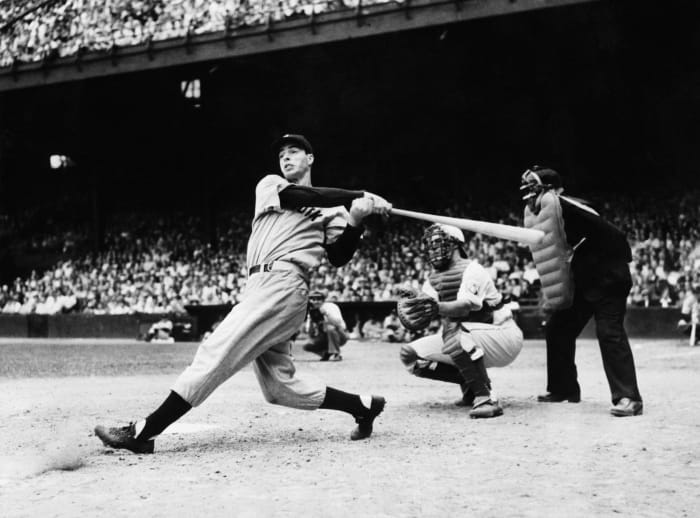
It is an iconic nickname, to be sure, but younger audiences may scratch their heads at this one. DiMaggio was a versatile, graceful player, a guy who could "do it all." In DiMaggio's day, that sort of skill set meant he was compared to a great and majestic ship. Perhaps a nickname more appropriate to its era than any other on this list, but one very fitting for one of the greatest Yankees of all-time.
Evander Holyfield: Real Deal

One of the most courageous, durable, and legendary fighters in boxing history, Holyfield is also the possessor of one of its greatest nicknames. Known for his unbelievable resolve and will, the "Real Deal" was everything his handle implied, and then some. If you don't believe me, just ask Mike Tyson.
Stu Grimson: The Grim Reaper

Grimson might well be the least-distinguished player on this list, but that doesn't matter, because his nickname fit him perfectly. Grimson went about 6-foot-2, 240 pounds, and was a feared enforcer for the majority of his career, one that saw him battling, among others, legendary brawler Bob Probert.
Kobe Bryant: The Black Mamba

Is this a great nickname? That depends on two things--whether or not you're a Kobe fan, and whether or not you think it's okay for athletes to give themselves a nickname. If you answer "no" to one or both, then you probably don't like it. Otherwise, you probably find it fitting, given Bryant's tendency to strike quickly and spectacularly, often leaving opposing teams and fans feeling plenty of pain.
Shawn Marion: The Matrix

One of the best open-court finishers and overall athletes in the NBA, Marion would routinely make incredible plays that seemed to defy physics. Given that his heyday coincided nicely with the release of groundbreaking The Matrix Trilogy, the nickname was an especially appropriate one.
Babe Ruth: The Sultan of Swat

There is no explanation necessary for this nickname, given to the man many feel is the greatest baseball player in history. Ruth was a superb pitcher, but truly captured the public's imagination with his prodigious home run power, especially in an era where homers were relatively rare. A truly great player, and a truly great nickname.
Stan Musial: Stan the Man

The nickname is a little bit lyrical, if you will, and aptly describes a man who racked up 3,630 career hits, was head and shoulders above just about all of his peers and one of the purest hitters and best overall players the sport has ever seen. "The Man" could also have referred to Musial's reputation as one of the most gentlemanly, modest and sportsmanlike athletes of his time.
Larry Bird: The Hick from French Lick

"Larry Legend" also could have applied here, and it was very self-explanatory, as nicknames go. However, "The Hfck From French Lick" is much more fun, rhymes and calls to mind Bird's humble roots growing up in a small, rural town. Those beginnings make Bird's status as one of the league's all-time trash talkers and clutch shooters even more enjoyable.
Joe Walcott: Jersey Joe

Walcott's name wasn't actually Joe Walcott. He took the name from that of one of his favorite fighters, a welterweight from Barbados. After taking the name, the man born Arnold Cream in Pennsauken, New Jersey, simply added "Jersey" to his name to distinguish himself. Does it have a great origin story? No, but it is one of the catchier nicknames out there even if Walcott is most known, unfortunately, for being on the receiving end of one of the hardest punches in boxing history courtesy of Rocky Marciano.
Joe Montana: Joe Cool
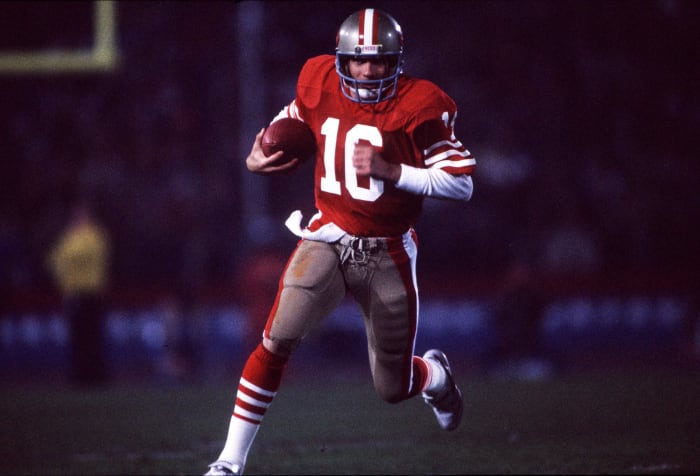
Before there was Tom Brady, there was Joe Montana, and he was the most reliable big-game quarterback the NFL had ever seen. His nickname's origins are obvious. No one was cooler under pressure than Montana, and he has the hardware — four Super Bowls and two Super Bowl MVPs -— to prove it. Whether it was tossing a strike to Dwight Clark for "The Catch" or leading a Super Bowl-winning drive, "Joe Cool" did it all.
Nick Young: Swaggy P

Any real attempt to explain the nickname of one of the NBA's most unrepentant chuckers of the basketball would probably be fruitless. Young's own explanation borders on nonsense, so let's instead focus on the fact that he's given fans countless entertaining moments, intentionally or otherwise, and that the nickname is, in fairness, extremely catchy.
Oscar De La Hoya: Golden Boy

De La Hoya was destined for big things when he represented the United States at the 1992 Olympics, and everyone knew it. His winning a gold medal as a lightweight could have been the genesis of his nickname, or it could have been the fact that everyone knew he was about to make a lot of money for himself and for boxing promoters by becoming the sport's biggest mainstream star in years.
Dominique Wilkins: The Human Highlight Reel

He wasn't the complete player that Michael Jordan was, but he was every bit the physical freak — and dunker. Wilkins might have actually exceeded Jordan's capacity in those areas, and his nickname is a reference to the fact that fans in attendance or watching on television could always count on Wilkins to reel off several spectacular plays game in and game out.
Rafer Alston: Skip to My Lou

Alston went from street-ball legend and AND1 Mixtape star to solid NBA player, but he didn't lose his trademark skipping dribble, the same thing that earned him his nickname. Alston's NBA career was solid, if unspectacular, but his legacy as one of the most entertaining street-ballers of all time is still going strong.
Jason Williams: White Chocolate

Chances are that if you are an NBA fan of a certain age, you were mesmerized by Williams' flashy play in the late 1990s and early 2000s. His passes were daring, often ridiculous and usually successful. Williams' playground style sometimes got him benched, particularly early in his career, and especially in the playoffs, but it also made him wildly popular. His nickname was given to him by a Sacramento Kings media relations staffer, who said his play reminded her of pickup games in Chicago.
Pete Rose: Charlie Hustle

Is it all that surprising that a guy like Rose took what was supposed to be a slight against him and turned it into his nickname? Whitey Ford derisively called baseball's all-time hit leader "Charlie Hustle" after he sprinted to first base after being walked in a spring training game, and Rose decided to embrace the moniker for the rest of his career. Given what became of his postplaying days, the "Hustle" part seems especially apropos.
Pernell Whitaker: Sweet Pea

Imagine getting beaten up in a boxing ring by a guy who doesn't hit very hard but hits you constantly and always seems to dodge or block your punches. Pretty frustrating, right? Now imagine in a sport filled with tough guys bearing tough nicknames, that the guy who just humiliated you is called "Sweet Pea" by his fans. You'd be enraged, right? Whitaker's nickname actually comes from the mishearing by a sportswriter of what his fans actually called him, which was "Sweet Pete."
Eldrick Woods: Tiger

Much like Magic Johnson, Tiger Woods' real name might as well be Tiger. But it is Eldrick, and therefore Tiger is technically a nickname and one that honors one of his father, Earl's, military friends who also was called Tiger. Would it really have been the same if courses had had to "Eldrick-proof" themselves to deal with Woods' prodigious talents? Of course not.
Anfernee Hardaway: Penny

When Hardaway and Shaquille O'Neal took the NBA by storm in the mid-1990s, everyone termed them "Shaq and Penny." "Shaq and Pretty" would have sounded strange, but "Pretty" was indeed what Hardaway's grandmother called him. But due to her southern accent, the word came out sounding like "Penny." Most would agree that "Penny" was a much more fun nickname for a player who possessed one of the league's most unique combinations of size and skill.
Shaquille O'Neal: Shaq

Arguably the most physically dominant player in league history, O'Neal's nickname is simple — a shortened version of his first name. "Shaq" has a certain intimidating quality to it, which is fitting, since O'Neal was the kind of guy who managed to impose his will on other enormously large human beings night after night.
Karl Malone: The Mailman

One of the most physically imposing players throughout his career, Malone was also one of the most consistent. It was this steadiness that earned him his nickname. As great as it was, it was also the basis for one of the legendary lines of trash talk in league history. During Game 1 of the 1997 NBA Finals, Malone missed two crucial free throws after Scottie Pippen whispered, "The Mailman doesn't deliver on Sunday," to him just before he shot.
Gary Payton: The Glove
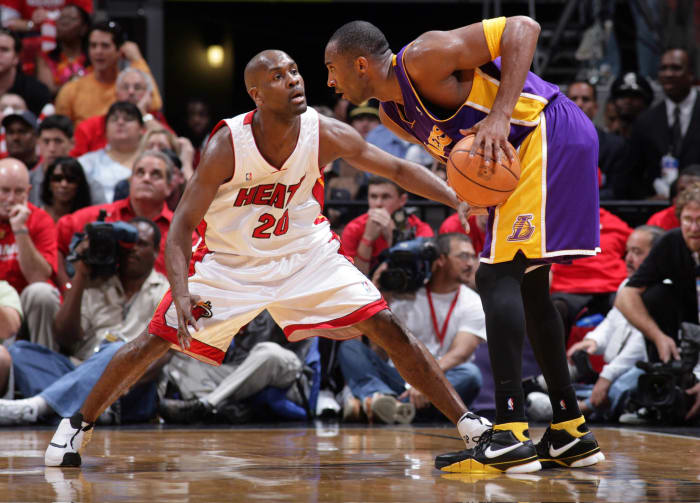
Payton was long regarded as one of the league's most tenacious on-ball defenders as well as one of its biggest trash talkers. It was the former quality that led to his nickname, and it was very well-deserved, as Payton is the only point guard in NBA history, and one of only four guards, period, to win Defensive Player of the Year.
Frank Thomas: The Big Hurt

Thomas goes about 6-foot-5, 275 pounds, and was, purely on physical stature, the most intimidating hitter of his era. His career batting average of .301 and his 521 home runs make "The Big Hurt" an easy nickname to understand. Thomas was one of the only power hitters of his era to avoid PED suspicion and had a mastery of the strike zone like few other hitters of his time.
Walter Payton: Sweetness

No one is entirely sure what the genesis of Payton's nickname is, other than the fact that he picked it up in college. Some felt it was a description of his graceful, smooth running style, but others hypothesized that it was a sarcastic description of his running, which was often vicious and painful — for the defenders trying to tackle one of the NFL's all-time greats.
Paul Pierce: The Truth

Pierce got his nickname from Shaquille O'Neal, and it is indeed a great one. Pierce was one of the best pure scorers in the league over the course of his career. He had as versatile an offensive game as anyone in the league despite not being a top-drawer athlete and leaper like some of his contemporaries. Those same players likely can't match accomplishments with Pierce, nor can they measure up in the nickname department.
"Mean" Joe Greene

No one is positive about the fine point details on this nickname, other than the fact that it is a reference to Greene's alma mater, North Texas. The school changed its nickname to the Mean Green in Greene's first season there, but it does not appear that this was because of Greene's prowess. In any case, he did not like the nickname, feeling that it misrepresented him. Opponents doubtless felt otherwise.
Joe Namath: Broadway Joe

Perhaps no city and player were better fits than New York and Namath. The QB, who grew up in small-town Beaver Falls, Pennsylvania, about 35 minutes outside of Pittsburgh, immediately took to the Big Apple, dressing in fur coats, hanging in the most elite social circles and becoming a tabloid fixture. The actual "Broadway Joe" nickname was coined by his Jets teammate Sherman Plunkett.
Dick Lane: Night Train

Lane, who holds the single-season record for interceptions with 14, was at first not thrilled with the "Night Train" nickname, which was connected to the music world. However, after seeing it used favorably in a headline, he came around on it. Lane finished his career with 68 interceptions and a reputation as one of the most violent tacklers in the league.
Pete Maravich: Pistol Pete

Arguably the greatest showman and ball-handler in basketball history, Maravich remains the NCAA's all-time leading scorer, with 3,667 points, good for 44.2 points per game. This happened pre-shot clock and pre-three point line, too. Maravich's nickname stemmed from the fact that he shot the ball from the side, as if he were holding a revolver.
Shawn Kemp: The Reign Man
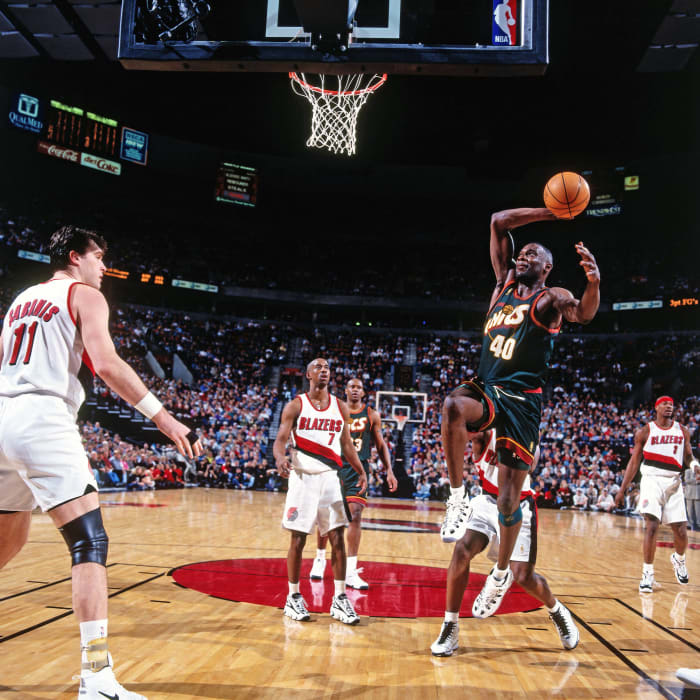
Sometimes, no matter how fitting a nickname is, there isn't a truly great story behind it. Kemp, the driving force (along with Gary Payton) behind the SuperSonics' run as a power in the Western Conference, was given his nickname by Seattle broadcaster Kevin Calabro, who saw the name on a poster and decided to bestow it on Kemp. The fact that he was the league's fiercest dunker and a force at power forward probably helped it stick.
Dominik Hasek: The Dominator

A good way to earn a nickname is to be so good that one just fits perfectly. Hasek's time in Buffalo saw him lead the league in save percentage six years in a row and take home the Vezina Trophy as the league's best goalie in five of those seasons. Given that level of performance, "The Dominator" is a fitting title.
Dave Parker: The Cobra

There is no readily apparent reason why Parker was known as "The Cobra," (although it is thought to have stemmed from his bat-waving stance), but given his physical gifts and the fact that he once hit a ball so hard that the seams ruptured — yes, he literally hit the cover off the ball — one imagines that it also might have had something to do with his bat speed and the lightning quickness with which he turned pitches into screaming line drives. Either way, the nickname was intimidating, and so was Parker.
Thomas Hearns: The Hitman

Hearns, one of the greatest pound-for-pound boxers in history as well as one of its most fearsome punchers, is a natural fit for a nickname like, "The Hitman." Known for "The War" with Marvin Hagler, a three-round epic that saw both fighters trade punches continuously, Hearns also had a pair of classic, and controversial, fights with "Sugar" Ray Leonard.
Darryl Dawkins: Chocolate Thunder

Dawkins, whose dunks were both ferocious and humorously named, picked up the "Chocolate Thunder" nickname from an even more legendary source: music icon Stevie Wonder, who frequently attended Sixers games. A pretty fitting nickname for a guy known for shattering backboards, methinks.
George Gervin: The Iceman

Gervin was known for three things: his prolific scoring prowess (he averaged 25.1 points per game for his career); his cool, unflappable nature on the court; and his almost alien ability to play basketball at the highest level while not sweating a drop. Those last two qualities were the source of his nickname, one of the coolest (pardon the shameless pun) of all time.
Willie Mays: The Say Hey Kid

Sometimes, the nickname makes the man. Other times, as with Willie Mays, the man makes the nickname. Is "The Say Hey Kid" a great nickname? At first blush, maybe not. But it's so unique, and the athlete connected to it so great — great enough that he could reasonably be called the greatest all-around baseball player ever — that it ends up belonging in any conversation about iconic monikers.
Reggie Jackson: Mr. October

This nickname needs no explanation, but one will be provided anyway. Reggie Jackson was a monster in the postseason, helping the Athletics to three straight World Series titles before moving on to the Yankees and winning two more championships in the Bronx. It was Yankees teammate Thurman Munson who gave him the "Mr. October" nickname, and Jackson backed it up, hitting three first-pitch home runs in a clinching Game 6 win in the 1977 World Series.
Jack Tatum: The Assassin

Tatum, one of the NFL's most feared and controversial hitters, was nicknamed "The Assassin" because of his violent, reckless style. One of his hits, in a preseason game, no less, infamously left Patriots wide receiver Darryl Stingley paralyzed from the waist down. Many elements of Tatum's playing style were later outlawed by the NFL.
Allen Iverson: The Answer

Iverson's nickname was given to him by a family friend and symbolized the fact that Iverson would be "The Answer" to the NBA's popularity woes. This was in the mid-1990s, at a time when Michael Jordan was not in the league, and its popularity was not nearly what it is today. As with many nicknames, its genesis is secondary to how famous its namesake made it.
Michael Jordan: Air Jordan

"MJ" or "His Airness" could have been the pick here, but "Air Jordan" most appropriately captures what Jordan was most famous for: feats of incredible athleticism, especially when going in for a dunk. The man many people consider the greatest player of all time doesn't necessarily have a nickname that measures up to his feats on the court. But then again, he's the most famous athlete in the world, so he's probably OK with the trade-off.
Ed Jones: Too Tall

"Too Tall" is a pretty obvious nickname for a guy standing 6-foot-9, but that's not abnormal for basketball. Thing of it is, Jones played football and got the nickname on his first day of practice at Tennessee State because his pants didn't fit properly. A teammate noted that this was because he was "too tall to play football," and the name stuck. Jones was so prolific at batting down passes during his time with the Cowboys that the NFL was compelled to start recording it as an official stat.
Ken Stabler: The Snake

Stabler was a villain for any football fan who disliked the Raiders, and there were plenty of those outside of Oakland. As such, a nickname like "The Snake" was perfect for the renegade quarterback. But it was actually one he had carried with him since high school when his coach bestowed it on him after a long, winding touchdown run. The name, then, makes perfect sense, but one almost wishes that it had been invented out of whole cloth, with no backstory at all.
William Perry: The Refrigerator

Believe it or not, there was a time when being 350 pounds was highly unusual for an interior lineman in the NFL. "The Fridge" stood 6-foot-3, weighed every bit of 350 and was a truly imposing figure for opposing offenses. The nickname came during his freshman year at Clemson, when a teammate barely fit into an elevator with Perry and the laundry they both had with them.
Reggie White: The Minister of Defense

White was an ordained minister and man of devout faith, which makes the origins of his nickname rather obvious. He also may well be the best defensive player in NFL history, having racked up 198 sacks, 13 Pro Bowls and 10 first-team All-Pro nods during his illustrious career.
Andre Rison: Bad Moon

Rison wanted his nickname to be Spider-Man, and during his time with the Kansas City Chiefs, it was. However, nicknames you give yourself rarely stick. As such, and owing to his oftentimes tumultuous off-field life, the wide receiver is much more commonly called "Bad Moon," for which he can thank ESPN anchor Chris Berman. Whether you like Berman or not, you have to admit that he gave one of the era's most talented receivers a fantastic nickname.
Rod Smart: He Hate Me

The only thing people remember about the XFL is that Vince McMahon created it and that Rod "He Hate Me" Smart was its biggest attraction. Smart wasn't that great of a player, but he took full advantage of an XFL policy allowing players to put more or less whatever they wanted on their jerseys. The attention even got Smart a look in the NFL, and he managed to stick around for parts of five seasons, including 2003, when he scored his only NFL TD in style — on a 100-yard kick return.
Deion Sanders: Prime Time

The "Prime Time" moniker, while it could have stemmed from any number of high-profile feats in pro sports, originated from evening pickup basketball games Sanders used to play with a high school teammate, where, unsurprisingly, his athletic feats left mouths agape. Rarely has a nickname better fit a player's personality and talents.
Tim Duncan: The Big Fundamental

Tim Duncan might be the most boring all-time great in any sport. In a league known for flashy dunks, snappy dressing and colorful personalities, Duncan's favorite shot was the bank shot, he dressed like a teenager heading to school and was as soft-spoken as they come. That said, he's thought of by most as, at worst, a top-15 player of all time, and at best, the greatest power forward in history.
Dale Earnhardt: The Intimidator

Aggressive drivers are scary enough on the actual roads. Now imagine a guy who was so aggressive that other professional race car drivers gave him the nickname "The Intimidator." Earnhardt was everything that the handle implied, and he was also one of the most popular drivers in the sport for many years. His black No. 3 car was one of the most recognizable sights in NASCAR.
Oscar Robertson: The Big O

The man who made triple-doubles a thing has a nickname that is obvious. His first name begins with the letter "O," and as a 6-foot-5 guard, he was uncommonly tall and physical for his era, dominating smaller players through a combination of size and skill. Robertson is regarded as a man before his time, skill-wise, and is also credited with inventing both the head fake and the fadeaway jump shot.
Elroy Hirsch: Crazy Legs

Hirsch was a tall, lanky guy with an unusual running style, and it is that running style that earned him the "Crazy Legs" nickname, with some observers suggesting that it appeared his legs were moving in six different directions at once. It must have been effective because he was a major receiving threat, notching 60 touchdowns in his NFL career and making both the Pro and College Football Halls of Fame.
Robert Horry: Big Shot Bob

If your team had Robert Horry, you felt great in close games. If your team was playing against Horry, had a two-point lead late in the game and his team had the ball, you were rightfully petrified. Never more than the fourth- or fifth-best player on any of his teams, Horry nonetheless developed a reputation for hitting huge shots at the biggest possible moments, earning him one of the best and most obvious nicknames in sports — not to mention seven NBA titles.
Hank Aaron: Hammerin' Hank
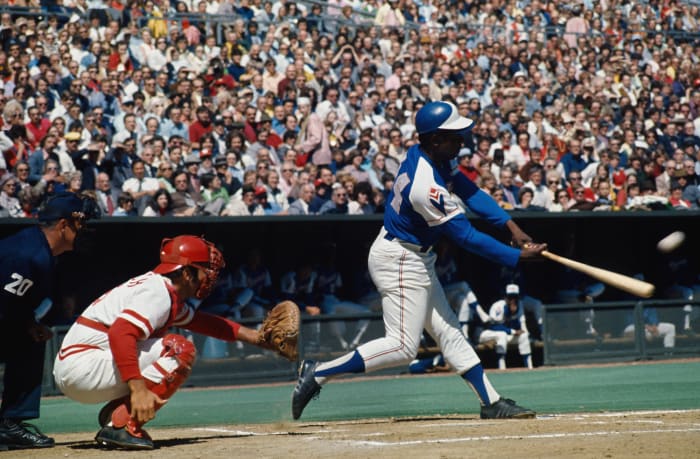
Sometimes the simplest nicknames are best, and what better one for a man many still consider baseball's true home run king than "Hammerin' Hank." Aaron's nickname requires no complicated explanation. He hit the ball very hard, very often, and it earned him this nickname with his teammates. End of story.
Randy Johnson: The Big Unit

Just look at that face, the one on top of the guy standing 6-foot-10, as he hurls a baseball at you at speeds reaching 100 miles per hour. Oh, and he throws a slider so nasty that if you miss it by 3 feet, no one will bat an eyelash. One of the best and most intimidating players in baseball history, Johnson's nickname is an obvious one, owing to his towering height and overall presence on the diamond.
Ray Mancini: Boom Boom

Most of the time, sons of athletes don't want to stand in their fathers' shadows, but Mancini, who inherited the "Boom Boom" moniker from his father, Lenny, took it and ran with it and is much more widely associated with it. Mancini started his career 29-1, and only a four-fight losing streak to end his time in the ring sullied an otherwise sterling record.
Wayne Gretzky: The Great One

When your own league wades into the debate and names you the greatest hockey player of all time, it isn't much of a debate anymore. Gretzky's nickname is self-explanatory, and his numbers, even playing in the run-and-gun 1980s, are still eye-popping and completely unreachable by any player, unless Sidney Crosby plays at a high level until he's around 50 years old.
Gordie Howe: Mr. Hockey

Wayne Gretzky might be the sport's greatest player, but Red Wings legend Gordie Howe, in many respects, was its most popular. His nickname suggests as much, as it is indicative of a man who transcended the sport. Howe's career spanned five decades, and even Gretzky himself idolized Howe. Mr. Hockey, indeed.
Ray Robinson: Sugar

How does a guy born Walker Smith Jr. become "Sugar" Ray Robinson? Well, he borrows his friend Ray Robinson's birth certificate so that he can get around the AAU's age restriction and box. Then a woman in the crowd at one of his boxing matches tells him he is "sweet as sugar." That's the story of an iconic nickname and one belonging to the man almost unanimously seen as the greatest pound-for-pound boxer of all time.
David Robinson: The Admiral

Robinson, by far the greatest basketball player in Navy history, was a singularly dominant force in college and one of the greatest centers in NBA history. "The Admiral" was a perfect nickname, blending his military background with his imposing presence on the court. For the record, his naval rank upon fulfilling his two-year service commitment was "Lieutenant, Junior Grade." Let's just stick with "The Admiral."
Chuck Wepner: The Bayonne Bleeder

Wepner, who inspired Sylvester Stallone to write the script for "Rocky," is well known for falling mere seconds short of going the full 15-round distance with Muhammad Ali and for knocking Ali down in their fight. His nickname, "The Bayonne Bleeder," stems from his New Jersey heritage but also his propensity for cuts. Despite that, Wepner is known for being one of the most durable fighters of his era.
Earvin Johnson: Magic

There are only a handful of nicknames so ubiquitous that people start to think of them as the person's actual name. Magic Johnson is one of them. The nickname was so widely used that the only people who didn't address him as such were public address announcers in visiting arenas, likely tired of having Johnson school the home team. The name was given to him when he was 15, after he notched an impressive triple-double, but does the origin really matter? He's Magic, plain and simple.
Hakeem Olajuwon: The Dream

Olajuwon is one of the greatest, smoothest big men ever to play basketball, and it is the latter quality that earned him his nickname. His dunks were so effortless in college that one coach remarked that watching him perform the feat, "looked like a dream." His natural ability coupled with a dizzying array of moves, including his signature "Dream shake," made guarding him more like a nightmare.
Mario Lemieux: Super Mario

Wayne Gretzky is thought of as the greatest hockey player ever. Bobby Orr is seen as the game's best defenseman, but Lemieux is widely regarded as the most physically gifted player ever to put on skates. Every bit of 6-foot-4, Lemieux had a build usually associated with lumbering enforcers. However, he was graceful, fast, fluid and supremely skilled, and despite battling injuries his whole career, put up incredible stats. In that context, "Super Mario" was the perfect moniker.
Roberto Duran: Hands of Stone

One of the greatest fighters of all time, Duran was also one of boxing's most legendary punchers — a pressure fighter who liked to brawl with opponents, mainly because he almost always came out on top. In a sport all about punching your opponent into submission, "Hands of Stone" is about as intimidating a nickname as there could be.
Julius Erving: Dr. J
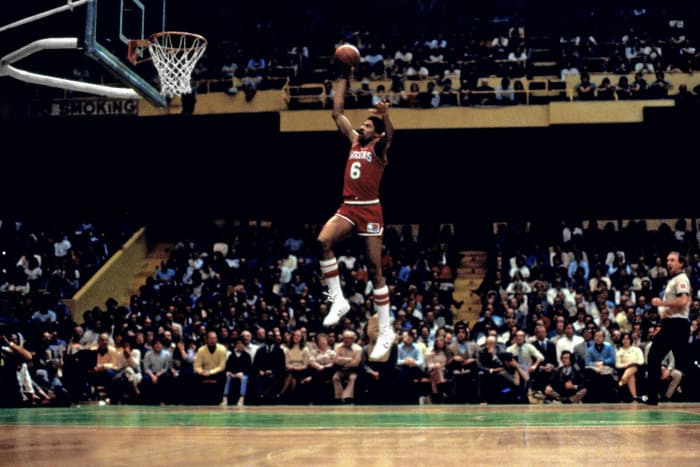
The nickname of one of basketball's highest fliers, the man who popularized the dunk like none before him, comes from one of his friends. Erving called the friend "professor" and was called "doctor" in return. That name morphed into "Dr. J," and the rest, as they say, is history.
Joe Frazier: Smokin' Joe

Frazier possessed a crushing left hook, one of the greatest single punches in the history of the sport, and despite being undersized for the heavyweight division, he was one of boxing's toughest and most feared forces. Though soft-spoken and humble outside of the ring, Smokin' Joe induced terror in his opponents when the bell rang.
Vinnie Johnson: The Microwave

A personal favorite here, as this nickname succinctly describes Johnson's game — he was a key bench player for the Pistons, one who could get hot in a hurry when he entered a contest — and rolls off the tongue nicely. While it may seem curious, at first, once someone explains the name, calling the man "Vinnie" seems almost wrong by comparison.
Ken Griffey Jr: The Kid

Griffey Jr.'s nickname, like so many others, has both simple and perfect origins. Griffey's father was a major leaguer, and father and son hit back-to-back home runs in 1990. It feels safe to say that's an event that won't happen again for a long time, if ever. Griffey Jr. was one of the game's greatest players and the possessor of its sweetest swing, and he went into the Hall of Fame with a record-breaking 99.32 percent of the vote.
Red Grange: The Galloping Ghost
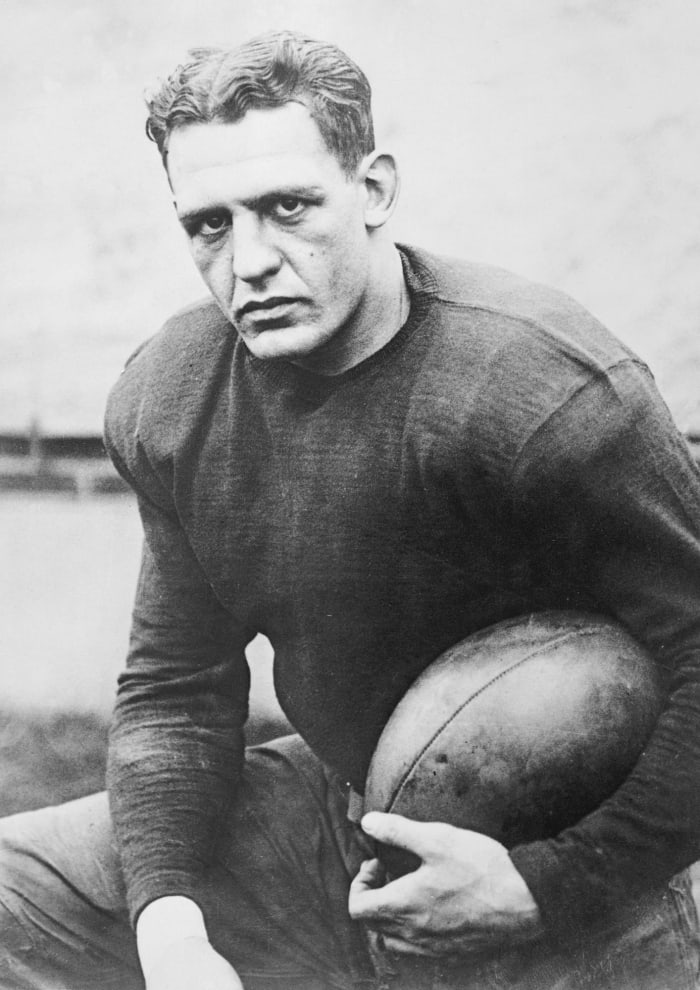
Griffey Jr.'s nickname, like so many others, has both simple and perfect origins. Griffey's father was a major leaguer, and father and son hit back-to-back home runs in 1990. It feels safe to say that's an event that won't happen again for a long time, if ever. Griffey Jr. was one of the game's greatest players and the possessor of its sweetest swing, and he went into the Hall of Fame with a record-breaking 99.32 percent of the vote.
Lou Groza: The Toe

Field goals from long distance haven't always been the norm in the NFL, but if you love a dramatic late-game kick, thank "The Toe." Groza was renowned for his ability to make long kicks, even those in excess of 50 yards, and was also an offensive tackle until an injury derailed that portion of his career. If you're going to be known for your kicking, "The Toe" is one heck of a nickname.
Muhammad Ali: The Greatest

No list of nicknames would be complete without Ali. While it is true that most self-given nicknames don't take hold, Ali's did. The greatest self-promoter and trash talker in sports history, Ali in his later years was as beloved and recognizable a sports figure as the world has ever seen. Was he actually the greatest fighter of all time? Most boxing historians will tell you, no. Then again, "The Greatest" transcended sports.
Chris Mueller has been plying his trade as a sports radio host - or hot-take artist, if you prefer - since 2008. He's called 93. 7 The Fan in Pittsburgh home since its inception in 2010, and currently co-hosts the award-winning (no, really) PM Team from 2-6 p
More must-reads:
- Cavaliers' Jaylon Tyson apologizes to LeBron James after Donovan Mitchell comment goes viral
- Cooper Flagg's dominant game makes NBA history, but it's not enough in Mavericks' loss
- The 'Most TD in first two NFL seasons' quiz
Breaking News
Trending News
Customize Your Newsletter
 +
+
Get the latest news and rumors, customized to your favorite sports and teams. Emailed daily. Always free!
PRIVACY POLICY EDITORIAL POLICY CONTACT US
ABOUT YARDBARKER TERMS OF SERVICE
Use of this website (including any and all parts and
components) constitutes your acceptance of these
Terms of Service and Privacy Policy.
This site is for entertainment purposes only.
There is no gambling offered on this site.
Gambling Problem? Call 1-800-Gambler.
